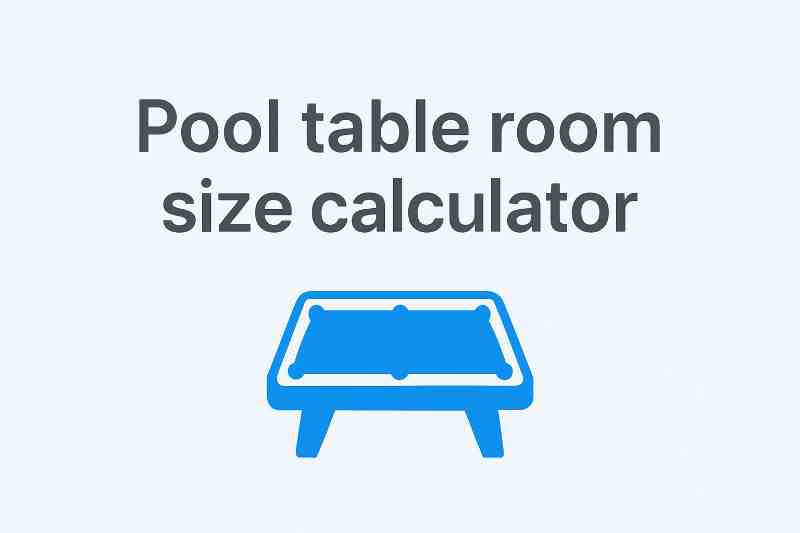Room Heater Size Calculator
Results
Heater Size Required: —
Based on room volume and insulation quality.Recommendations: —
For efficient and comfortable heating.Not sure what size electric heater you need for your room? Using the wrong size can leave you shivering—or drive up your energy bill. Our Room Heater Size Calculator takes out the guesswork by helping you find the perfect kilowatt (kW) rating based on room size, insulation, and climate.
Whether you're heating a bedroom, office, garage, or open living space, this tool gives you instant, accurate heating power recommendations.
How to Calculate Room Size for Heating
The basic way to size a room heater is to calculate the volume of your room and then apply a heating factor (W/m³ or BTU/ft³) depending on your insulation and location.
Formula to Calculate Heating Requirement (Metric):
kW Required = (Room Volume in m³ × Heating Factor) / 1000
Room Volume (m³) = Length × Width × Height
Heating Factor:
- Well insulated: 30–40 W/m³
- Average insulation: 50 W/m³
- Poor insulation: 60–70+ W/m³
Example: A 5m x 4m room with 2.5m ceiling = 50m³ volume. With average insulation:
50 × 50 = 2500 watts = 2.5 kW heater needed
Room Size Heating Calculator (Quick Chart)
| Room Size (m²) | Ceiling Height | Estimated kW Needed |
|---|---|---|
| 10 m² | 2.4 m | 1.2 – 1.5 kW |
| 15 m² | 2.4 m | 1.8 – 2.2 kW |
| 20 m² | 2.4 m | 2.4 – 3.0 kW |
| 25 m² | 2.4 m | 3.0 – 3.5 kW |
| 30 m² | 2.4 m | 3.5 – 4.2 kW |
What Size Room Will a 3kW Heater Heat?
A 3kW electric heater will comfortably heat a room of about 20–25 square meters with standard 2.4–2.5 meter ceilings and average insulation. This is roughly the size of a medium living room or large bedroom.
How Do You Calculate the Heat Load of a Room?
The heat load is the total heating energy (in watts or BTU) required to maintain a comfortable indoor temperature in your room. It's affected by:
- Room dimensions (length × width × height)
- Insulation quality
- Window size and glazing
- Outdoor climate
- Number of external walls
- Sun exposure or shading
Our calculator estimates this automatically, but professionals often use detailed heat load equations for HVAC design.
How Do You Calculate kW for Heating a Room?
Here’s a step-by-step:
- Measure the room in meters (Length × Width × Height)
- Multiply to get the volume in m³
- Choose a heating factor based on insulation (e.g., 50 W/m³)
- Multiply volume × factor, then divide by 1000 to convert to kW
Example: 40 m³ × 50 = 2,000W → 2.0 kW heater
Additional Considerations for Room Heating
- Older homes may need more heating capacity due to poor insulation
- Open-plan areas or vaulted ceilings require higher output
- Multiple heaters may be better than one large unit for even heat
- Smart thermostats improve control and energy efficiency
FAQs About Room Heater Sizing
Can I use one heater for multiple rooms?
Not ideal. Rooms with doors or walls block airflow. It's better to heat each room individually or use a central system.
Should I oversize my room heater just in case?
No—oversized heaters may heat too quickly and cycle off frequently, causing uneven temperatures and wasted energy. It’s best to size it properly for comfort and efficiency.
What’s the best heater for a bedroom?
Panel heaters, oil-filled radiators, or convection heaters around 1.5–2 kW are great for bedrooms up to 15–20 m². Quiet operation is also important for sleep comfort.
How much electricity does a 2 kW heater use?
A 2 kW heater running for 1 hour uses 2 kilowatt-hours (kWh) of electricity. Multiply by your energy rate to find the cost.
Final Thoughts
Finding the right heater size can make all the difference in comfort and energy bills. Use our Room Heater Size Calculator to quickly determine the correct kW rating based on your room dimensions and insulation quality. It’s the easiest way to stay warm without overspending on power or equipment.



